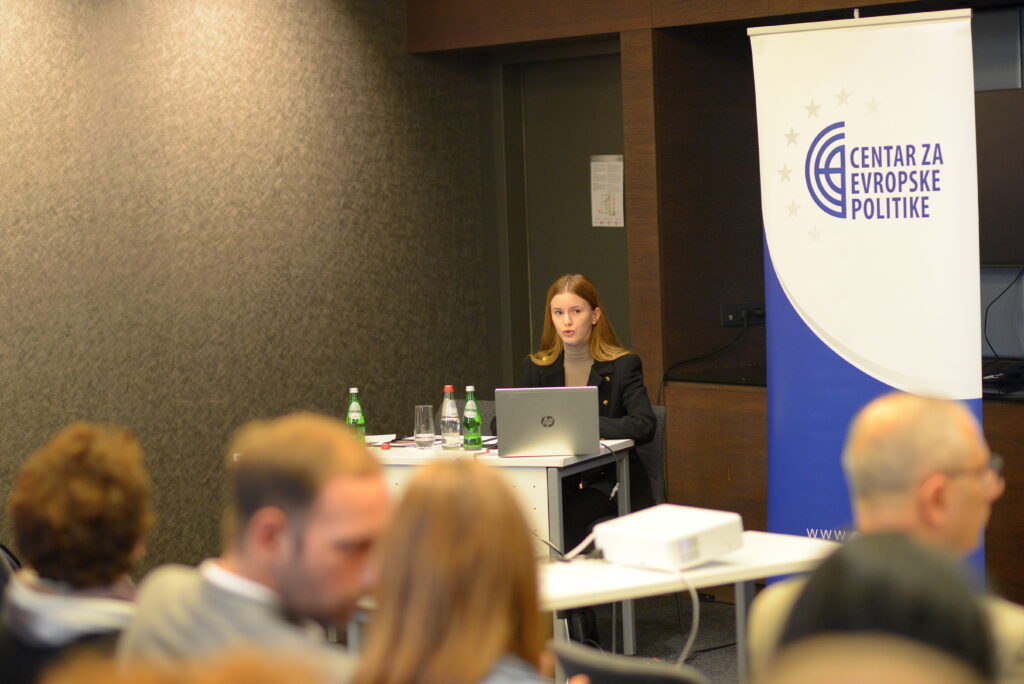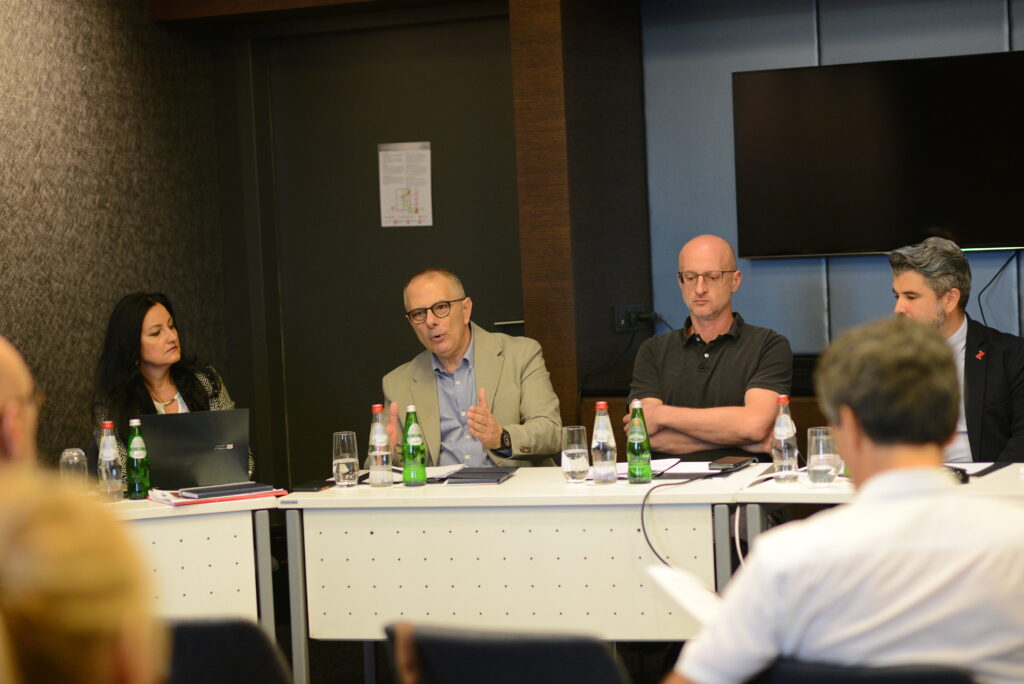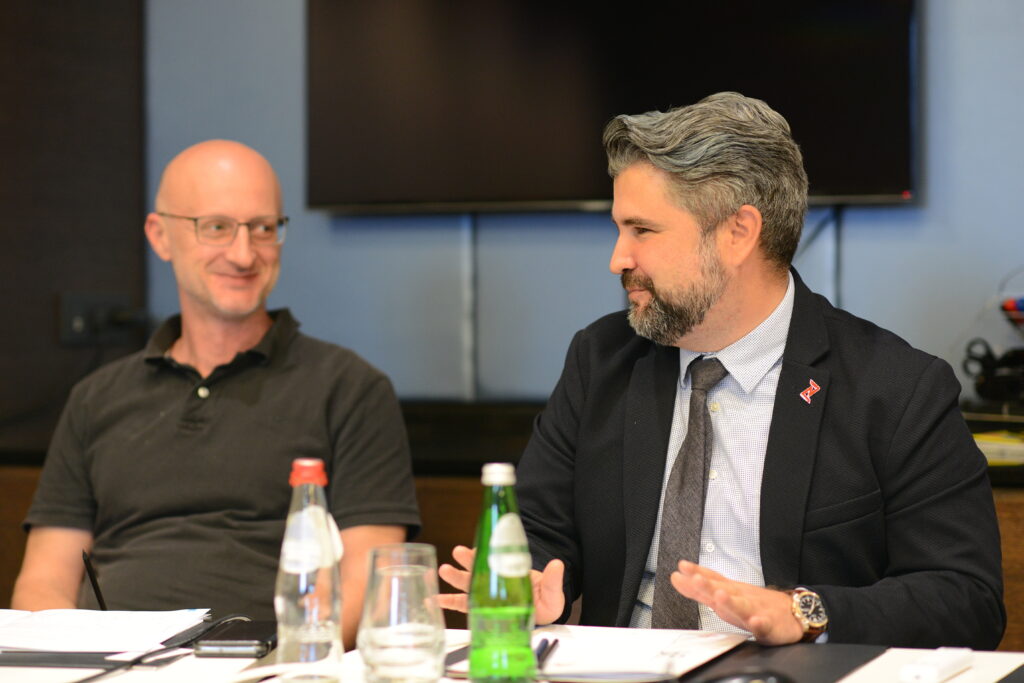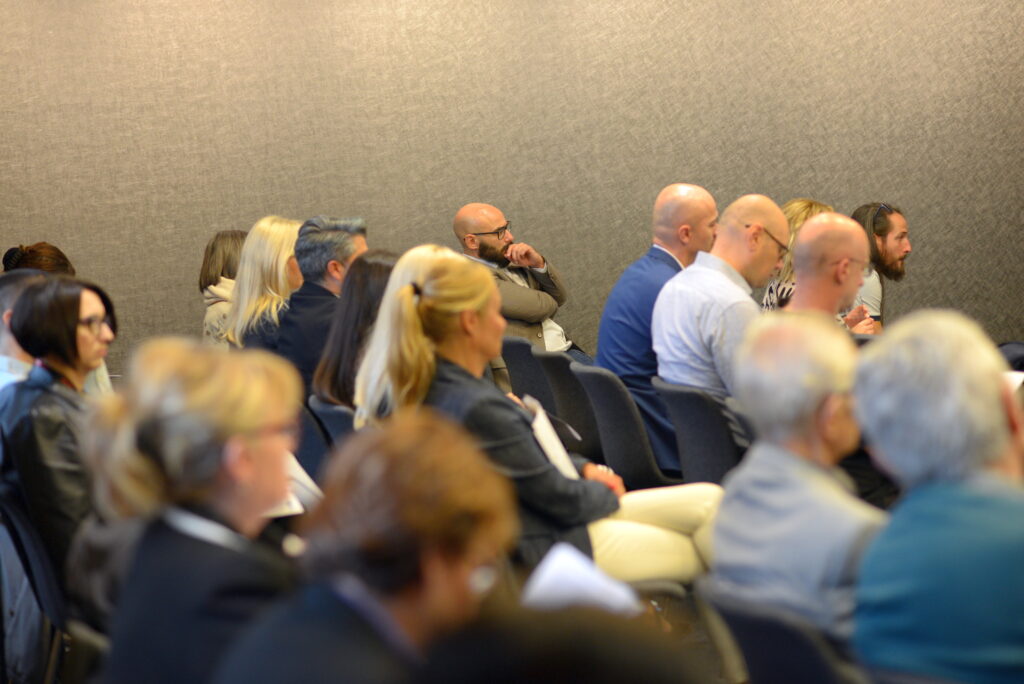Headquarters: Svetog Nauma 7, 11000
Office address: Đorđa Vajferta 13, 11000
Phone:: +381 11 4529 323

27 October 2023 – Today in Belgrade, the European Policy Centre organised a panel discussion on Transparency and inclusiveness of policy creation and regulations – the eConsultation portal: a new instrument, untapped opportunities, as well as a WeBER 3.0 meeting of the National Working Group for monitoring Public Administration Reform in Serbia.
The event was opened by the Programme Director of CEP, Milena Mihajlović, and the Junior Researcher at CEP, Milica Divljak, who presented the findings and the recommendations of the research on the use of the eConsultation portal, after which the panel discussed the topic of transparency and inclusiveness in the creation of regulations and public policy documents in a broader sense. Panellists were Žarko Stepanović, Acting Assistant Minister for Human and Minority Rights and Social Dialogue, Ninoslav Kekić, Assistant Director, Public Policy Secretariat of the Republic of Serbia, Nemanja Nenadić, Programme Director in Transparency Serbia, Marija Ušumović Davčik, Head of the City Administration of Subotica, and Vladimir Mihajlović, Researcher at CEP. Journalist Suzana Trninić moderated the panel.

Stepanović said that the eConsultation portal originated as an initiative of the Office for Cooperation with Civil Society to be “a central place where interested parties can follow and participate in consultation processes“. Stepanović said that the old system still works and that transparency is endured on the individual websites of the authorities, but Portal should be an extension and an opportunity to see the comments of others in real-time.
“This undoubtedly contributes to transparency and makes it easier for citizens to follow because everything is in one place. This is not just a formal matter, and it brings citizens closer to the opportunity to participate. There is no good decision-making if citizens do not participate in making them”, he said.

“The consultative process is such that the comment should be answered as soon as possible so that others can see it. Users should be encouraged to repeat the comment because then others will see it and insist that the comment be adopted if they consider it good”, said Kekić. “Everyone is now competing in transparency and technologies, and we were guided by the experiences of Sweden and Denmark, which, in turn, emulated countries outside Europe”, Kekić added.

Nenadić said that the Portal has a lot of potential, including the possibility of commenting.
“Comments can be useful to others who want to get to know the subject, but also for practical reasons. The second and more important reason is that users react to something they don’t agree with because, without that, we can end up with a regulation that is worse than the original version”, he pointed out.
“Citizens do not use enough opportunities to influence the content of acts and public policy documents, mainly because they do not trust that their proposals will be considered. On the other hand, this non-participation reduces the enthusiasm of management representatives to carry out consultative processes because there are no participants. I don’t think we will have a good solution as long as legal obligations operate voluntarily. Until we have a body that could ensure that all the rules are implemented in practice, we will not have a solution to this vicious circle,” said Nenadić.
“When a regulation or public policy document is being prepared, we consider that consultations serve citizens and civil society, but it is the other way around. It is a service to the proposing authority. Until the state authorities realise that they are getting free knowledge through consultations, that will be the main stumbling block in consultations,” said Mihajlović.

Ušumović Davčik pointed out that there has been a problem of lack of quality personnel for years. “Local administration has not been interesting for young, educated personnel for a long time. An additional limitation is the limited number of employees and the need to obtain consent for new employment. This sometimes takes months. The example of Subotica is good because it is not such a small community, and it is easier to manage, but small communities certainly have a bigger problem,” she said. “All of us still need to learn, representatives of local authorities, but also citizens.” We have encountered that only individuals who are not personally interested take part in the public debate but have time and are dealing with topics that are not related to them, so quality suggestions are not received because the prescribed individuals do not participate. The documents are directly related,” she added.
“Concerning the total number of citizens, a small number of citizens participate and contribute to adopting regulations, ” concluded Ušumović Davčik.
This panel discussion was held within the CEP’s Annual Work Programme 2023, in the framework of CEP’s Strategic Plan for Good Governance, which the CEP implements with the support of the Delegation of the European Union in Serbia.
This was followed by the twelfth meeting of the WeBER 3.0 National Working Group for Monitoring Public Administration Reform in Serbia, the focus of which was the presentation and discussion of the Draft Guidelines for solving management problems and public administration reform at the local level in accordance with a citizen-oriented approach. The meeting was opened by Jovana Knežević, Project and Grant Manager of the WeBER 3.0 initiative. After a short introduction during which the project and small grants program were presented, the Draft Guidelines were presented. It was pointed out that the Guidelines are intended for civil society organisations at the local level for implementation within the WeBER 3.0 Small Grants Programme and that their purpose is to prioritise the needs, preferences and wishes of citizens in the process of decision-making and implementation of reforms.
In the following, Miloš Đinđić, the Lead Researcher on the WeBER 3.0 project, presented the key concepts on which the Guidelines are based – a design thinking approach and a checklist of goals for sustainable development. After that, the individual steps for the implementation of the Guidelines were presented in detail, with an active discussion by the guests from the civil sector, as well as representatives of state institutions from the Republic of Serbia Public Policy Secretariat, the Ministry of State Administration and Local Self-Government, the Agency for the Prevention of Corruption, the General Secretariat of the Government of the Republic of Serbia, as well as representatives of the Delegation of the European Union in Serbia.